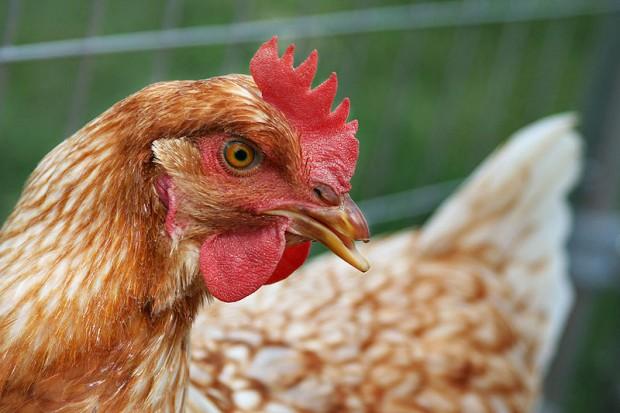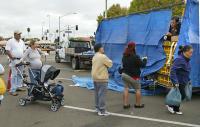Richmond bans the sale of live chickens

photo by Thegreenj, courtesy of Wikipedia Commons
By: Wendi Jonassen | September 29, 2011 – 1:00 pm
The City Council voted Tuesday to prohibit the sale of live chickens at the Richmond’s Certified Farmer’s Market, igniting an eruption of cheers from animal rights supporters who filled City Hall.
The crowd, which consisted mostly of visitors to Richmond, was there on a larger animal-rights agenda, fueled by a recent victory in banning live chicken sales at the Heart of the City Farmer’s Market in San Francisco. Despite the determination of supporters, the ban will affect only one vendor at Richmond’s Farmer’s Market, and then only for two months.
The ban will take effect October 31, when the Richmond Certified Farmer’s Market contract is due for renewal. The state of California is banning the sale of live animals in parking lots and on sidewalks beginning in 2012. Though there was some confusion over the state’s legislation, Richmond City Attorney Randy Riddle assured the council that the ban will include poultry.
“When we know that in January this will be banned, my position is such that, let us get comfortable with the contract that is inline with what we know will be state law coming up very soon,” Mayor Gayle McLaughlin said.
The live-chicken vendor, Raymond Young, has had repeated public confrontations in San Francisco with two of the groups present Tuesday night: LBGT Compassion Group and In Defense of Animals. In Richmond, the groups said they found the same health code violations and animal cruelty instances that they found at Young’s previous operation in San Francisco.
San Francisco’s ban left Richmond as the sole city in the Bay Area where Young could sell live chickens. He sells about 700 birds a week at the Richmond Certified Farmer’s Market, according to the market’s president, Tom Cloman.
Live animal sales are allowed, but not within 20 feet of produce and eggs, according to the California health code. Violations occur whenever a customer buys a chicken, which Young and his workers put into paper and plastic bags, and the customer then walks around the market shopping for produce.
The health regulation exists to prevent feces, which carries bacterial disease, from spreading through the farmer’s market. The public is directly exposed to feces on the outside of the plastic bags and on the workers, said Andrew Zollman of the LGBT Compassion Group, and the feces is then carried around the market and onto public transit.
According to the code, signs must be posted instructing customers in three languages – English, Spanish, and Chinese – not to walk around the market after they have purchased the chickens.
But it’s a difficult rule to enforce and requires extra resources from city.
“We can’t fix the this problem, it’s impossible,” said Denise Bolbol in the public comment session. “I watched multiple security guards unable to keep these people 20 feet from other vendors with chickens in their bags.”
Though the chicken-vendor Young has received several environmental health code violations at Richmond, he has corrected his violations prior to the next inspection every time, said LaShonda Wilson, the assistant city manager. Cloman, the market manager, confirmed this in his brief objection to the prohibition.
Pathogens and disease were also a common theme in the argument against selling live chickens. A statewide surveillance program that conducts health inspections on chickens “that are spotty” only checks for Avian influenza and Newcastle virus, and does not check for bacterial infections, Wilson said.
Due to lack of resources, the state has given Young kits to test the chickens himself and then requires him to submit the results to the state. Animal rights supporters said they didn’t trust his reporting.
The LGBT Compassion group has questioned Young’s credibility before, arguing that he is not actually involved in raising the chickens, but instead buys them from large producers such as Gemperle Farms. Since these farms are fully automated, Zollman said, Young couldn’t possibly be doing any of his own farming.
One concern, said Councilmember Jeff Ritterman, is that selling factory-farmed chickens at a farmer’s market misleads the consumer into thinking the chicken is organic.
Though he agreed that factory farming was disturbing, Councilmember Tom Butt said that it is important for children to see where their food comes from, which was the primary reason that he didn’t vote to support the ban.
“Most people don’t know where food comes from,” Butt said. “They think it comes from the grocery store. I think it does people good to see where food comes from, to realize that that chicken breast comes from an animal with feathers on it and it doesn’t come from a package.”
The ban is an act of discrimination, Cloman said, which is the same argument brought against the animal rights groups in San Francisco by Young.
“These groups have literally pounded this Asian farmer to run him out of business,” Cloman said.
Cloman barely got through his argument when his public comment time ran out and the crowd loudly interrupted and hurried him off the podium.
Over the yells of the crowd, Cloman turned to the council. “Don’t let this group bully you,” he said, his voice barely audible.
Cloman found his only other support from a dissenter in the crowd who labeled the issue one of meat-eaters versus vegetarians.
The dozens who had come out to speak against Young had already been protesting Richmond’s Certified Farmer’s Market, and had bombarded Mayor McLaughlin with 1,015 emails.
The City Council’s ban will only be effective for two months – starting October 31, when the contract is redrawn, and ending in 2012, when the state laws override the council. McLaughlin said she didn’t want the city to spend valuable resources on this issue, even for two months.
“I certainly believe that our staff will have to continue to monitor this and I do not think this is good use of our staff’s time over the next two months,” McLaughin said.
“I am torn,” Councilmember Jovanka Beckles said. While she said she didn’t necessarily agree with the animal rights’ groups, she agreed that the city needs to allocate its valuable resources to other issues.
The final vote was 4-2. It was hard to hear the announcement of the votes over the roar of excitement from the ban’s supporters, but with Councilmember Nat Bates absent, Butt and Councilmember Corky Booze were the only voters against the prohibition.
Connect with Richmond Confidential on Facebook, or follow us on Twitter.
Live birds banned at Richmond farmer's market
By Hannah Dreier
Oakland Tribune
Posted: 09/30/2011 03:12:01 PM PDT
Updated: 09/30/2011 07:07:32 PM PDT
Click photo to enlarge

Raymond Young of Raymond Young's Poultry Company takes orders for live chickens from a line of...
RICHMOND -- With its proximity to roaring traffic and paucity of organic produce, the Richmond Certified Farmers Market is no foodie mecca. But it does boast one product not found at its more sprawling competitors: live poultry.
Now, thanks to a City Council decision spurred by months of protests, Richmond's chicken stand is closing.
A group of vegan protesters showed up en masse Tuesday night and flooded Mayor Gayle McLaughlin's inbox with more than 1,000 emails charging that the vendor Raymond Young keeps his chickens in unsafe, inhumane conditions.
Citing possible animal cruelty and ongoing administrative headaches, the City Council voted 4-2 to shut down what protesters say is the last open-air chicken stand outside of Stockton.
Once in full view, Young now keeps his chickens hidden behind a tarp on a truck bed on the far end of Richmond's weekly market.
On Friday, a stream of mostly Asian women paid Young $6.50 each and then walked over to the truck to accept their purchase from a hand extended through the tarp walls.
Customers said that like the other offerings at the market, the chickens are healthier and tastier than those available at the supermarket and an essential part of their diet.
The chickens also attract practitioners of animistic religions.
Poet Saeyand, a Mien immigrant from Thailand, bought a hen to sacrifice for the health of her child on an auspicious day.
"To do the ceremony, you need a fresh chicken," she said, tapping her softly clucking paper bag.
"If my children are sick, I buy the chicken and it helps them not go to the hospital. With a chicken from the store, it won't work."
Council members Jovanka Beckles and Corky Booze expressed concern Tuesday about the impact closing the stand might have on the Asian residents that makes up 13 percent of Richmond's population.
Young, who has operated here for six years, says he generally sells 700 hens on market days, even with the vegans protesting weekly.
Jennie Ong, director of the Oakland Chinatown Chamber of Commerce, wishes the protesters had worked harder to come to an agreement that made room for these cultural practices.
"I feel like maybe this could be handled in a way that could be more sensitive to the Chinese culture," she said. "Maybe we could do some kind of reform to make things more humane."
On Friday, customers said they were unlikely to patronize the handful of brick and mortar shops in neighboring cities that sell live poultry, either because they did not have time for the trip or because they wouldn't be able to travel with a cooing chicken on public transportation.
The protesters, who have won campaigns against three other live markets in Oakland and San Francisco, say there shouldn't be cultural excuses for the law.
Alex Felsinger, 25, joined the campaign after witnessing what looked like extreme cruelty at Young's San Francisco Civic Center stand.
"We do advocate for a vegan diet," he said, "however, we are quick to point out that this isn't the only food source. Those council members act like people are going to starve if they can't get those chickens"
Although Contra Costa County officials say they have no record of serious health code violations at the Richmond stand, protesters say they routinely documented problems such as cramped cages, no access to water, and birds and feces too close to produce, eggs and customers.
They also believe that the poultry are "spent" egg-laying chickens from large Central Valley farms that are no longer productive.
Councilman Jeff Ritterman advocated for closing the stand in part because it could be misleading to sell industrial chickens at a farmers market.
But Asian advocates say that farmers markets, which cater to people looking for newly harvested food, could be perfect venues for live chickens.
"While this is a practice among Asian consumers, I think it's larger than that," said Clarence Wong of Asian Health Services "The idea is that you want to eat food that's very fresh."
In his view, slaughtering a Central Valley chicken before dinner isn't so different from eating a locally grown tomato picked from the vine that morning.
Beckles and McLaughlin noted that regardless of the council decision, the stand would likely have to close in January when a state bill outlawing roadside animal sales goes into effect.
The protesters say they will now turn their attention to a vendor in Stockton.
Young will shut down his stand this month but will continue to sell hens at his Modesto farm.
"The protesters won't come to my farm; they wouldn't go that far," he said. "At least, I hope not."
Contact Hannah Dreier at 510-262-2787. Follow her at Twitter.com/hannahdreier